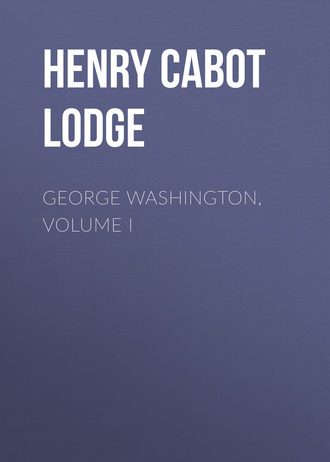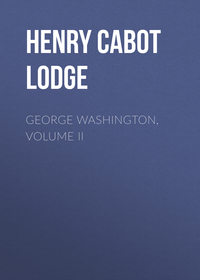 полная версия
полная версияGeorge Washington, Volume I
Washington sent André to the gallows because it was his duty to do so, but he pitied him none the less, and whatever he may have thought of the means André employed to effect his end, he made no comment upon him, except to say that "he met his fate with that fortitude which was to be expected from an accomplished man and gallant officer." As to Arnold, he was almost equally silent. When obliged to refer to him he did so in the plainest and simplest way, and only in a familiar letter to Laurens do we get a glimpse of his feelings. He wrote: "I am mistaken if at this time Arnold is undergoing the torment of a mental hell. He wants feeling. From some traits of his character which have lately come to my knowledge, he seems to have been so hackneyed in villainy, and so lost to all sense of honor and shame, that, while his faculties will enable him to continue his sordid pursuits, there will be no time for remorse." With this single expression of measureless contempt, Washington let Arnold drop from his life. The first shock had touched him to the quick, although it could not shake his steady mind. Reflection revealed to him the extraordinary baseness of Arnold's real character, and he cast the thought of him out forever, content to leave the traitor to the tender mercies of history. The calmness and dignity, the firmness and deep feeling which Washington exhibited, are of far more interest than the abortive treason, and have as real a value now as they had then, when suspicion for a moment ran riot, and men wondered "whom they could trust."
The treason of Arnold swept like a black cloud across the sky, broke, and left everything as before. That such a base peril should have existed was alarming and hateful. That it should have been exploded harmlessly made all men give a deep sigh of relief. But neither the treason nor its discovery altered the current of events one jot. The summer had come and gone. The French had arrived, and no blow had been struck. There was nothing to show for the campaign but inaction, disappointment, and the loss of the Carolinas. With the commander-in-chief, through it all, were ever present two great questions, getting more portentous and more difficult of solution with each succeeding day. How he was to keep his army in existence was one, and how he was to hold the government together was the other. He had thirteen tired States, a general government almost impotent, a bankrupt treasury, and a broken credit. The American Revolution had come down to the question of whether the brain, will, and nerve of one man could keep the machine going long enough to find fit opportunity for a final and decisive stroke. Washington had confidence in the people of the country and in himself, but the difficulties in the way were huge, and the means of surmounting them slight. There is here and there a passionate undertone in the letters of this period, which shows us the moments when the waves of trouble and disaster seemed to sweep over him. But the feeling passed, or was trampled under foot, for there was no break in the steady fight against untoward circumstances, or in the grim refusal to accept defeat.
It is almost impossible now to conceive the actual condition at that time of every matter of detail which makes military and political existence possible. No general phrases can do justice to the situation of the army; and the petty miseries and privations, which made life unendurable, went on from day to day in ever varying forms. While Washington was hearing the first ill news from the south and struggling with the problem on that side, and at the same time was planning with Lafayette how to take advantage of the French succors, the means of subsisting his army were wholly giving out. The men actually had no food. For days, as Washington wrote, there was no meat at all in camp. Goaded by hunger, a Connecticut regiment mutinied. They were brought back to duty, but held out steadily for their pay, which they had not received for five months. Indeed, the whole army was more or less mutinous, and it was only by the utmost tact that Washington kept them from wholesale desertion. After the summer had passed and the chance for a decisive campaign had gone with it, the excitement of expected action ceased to sustain the men, and the unclothed, unpaid, unfed soldiers began again to get restive. We can imagine what the condition of the rank and file must have been when we find that Washington himself could not procure an express from the quartermaster-general, and was obliged to send a letter to the Minister of France by the unsafe and slow medium of the post. He was expected to carry on a war against a rich and powerful enemy, and he could not even pay a courier to carry his dispatches.
With the commander-in-chief thus straitened, the sufferings of the men grew to be intolerable, and the spirit of revolt which had been checked through the summer began again to appear. At last, in January, 1781, it burst all the bounds. The Pennsylvania line mutinied and threatened Congress. Attempts on the part of the English to seduce them failed, but they remained in a state of open rebellion. The officers were powerless, and it looked as if the disaffection would spread, and the whole army go to pieces in the very face of the enemy. Washington held firm, and intended in his unshaken way to bring them back to their duty without yielding in a dangerous fashion. But the government of Pennsylvania, at last thoroughly frightened, rushed into the field, and patched up a compromise which contained most perilous concessions. The natural consequence was a fresh mutiny in the New Jersey line, and this time Washington determined that he would not be forestalled. He sent forward at once some regiments of loyal troops, suppressed the mutiny suddenly and with a strong hand, and hanged two of the ringleaders. The difficulty was conquered, and discipline restored.
To take this course required great boldness, for these mutinies were of no ordinary character. In the first place, it was impossible to tell whether any troops would do their duty against their fellows, and failure would have been fatal. In the second place, the grievances of the soldiers were very great, and their complaints were entirely righteous. Washington felt the profoundest sympathy with his men, and it was no easy matter to maintain order with soldiers tried almost beyond endurance, against their comrades whose claims were just. Two things saved the army. One was Washington's great influence with the men and their utter belief in him. The other was the quality of the men themselves. Lafayette said they were the most patient and patriotic soldiers the world had seen, and it is easy to believe him. The wonder is, not that they mutinied when they did, but that the whole army had not mutinied and abandoned the struggle years before. The misfortunes and mistakes of the Revolution, to whomever due, were in no respect to be charged to the army, and the conduct of the troops through all the dreary months of starvation and cold and poverty is a proof of the intelligent patriotism and patient courage of the American soldier which can never be gainsaid. To fight successful battles is the test of a good general, but to hold together a suffering army through years of unexampled privations, to meet endless failure of details with unending expedients, and then to fight battles and plan campaigns, shows a leader who was far more than a good general. Such multiplied trials and difficulties are overcome only by a great soldier who with small means achieves large results, and by a great man who by force of will and character can establish with all who follow him a power which no miseries can conquer, and no suffering diminish.
The height reached by the troubles in the army and their menacing character had, however, a good as well as a bad side. They penetrated the indifference and carelessness of both Congress and the States. Gentlemen in the confederate and local administrations and legislatures woke up to a realizing sense that the dissolution of the army meant a general wreck, in which their own necks would be in very considerable danger; and they also had an uneasy feeling that starving and mutinous soldiers were very uncertain in taking revenge. The condition of the army gave a sudden and piercing reality to Washington's indignant words to Mathews on October 4: "At a time when public harmony is so essential, when we should aid and assist each other with all our abilities, when our hearts should be open to information and our hands ready to administer relief, to find distrusts and jealousies taking possession of the mind and a party spirit prevailing affords a most melancholy reflection, and forebodes no good." The hoarse murmur of impending mutiny emphasized strongly the words written on the same day to Duane: "The history of the war is a history of false hopes and temporary expedients. Would to God they were to end here."
The events in the south, too, had a sobering effect. The congressional general Gates had not proved a success. His defeat at Camden had been terribly complete, and his flight had been too rapid to inspire confidence in his capacity for recuperation. The members of Congress were thus led to believe that as managers of military matters they left much to be desired; and when Washington, on October 11, addressed to them one of his long and admirable letters on reorganization, it was received in a very chastened spirit. They had listened to many such letters before, and had benefited by them always a little, but danger and defeat gave this one peculiar point. They therefore accepted the situation, and adopted all the suggestions of the commander-in-chief. They also in the same reasonable frame of mind determined that Washington should select the next general for the southern army. A good deal could have been saved had this decision been reached before; but even now it was not too late. October 14, Washington appointed Greene to this post of difficulty and danger, and Greene's assumption of the command marks the turning-point in the tide of disaster, and the beginning of the ultimate expulsion of the British from the only portion of the colonies where they had made a tolerable campaign.
The uses of adversity, moreover, did not stop here. They extended to the States, which began to grow more vigorous in action, and to show signs of appreciating the gravity of the situation and the duties which rested upon them. This change and improvement both in Congress and the States came none too soon. Indeed, as it was, the results of their renewed efforts were too slow to be felt at once by the army, and mutinies broke out even after the new spirit had shown itself. Washington also sent Knox to travel from State to State, to see the various governors, and lay the situation of affairs before them; yet even with such a text it was a difficult struggle to get the States to make quick and strong exertions sufficient to prevent a partial mutiny from becoming a general revolt. The lesson, however, had had its effect. For the moment, at least, the cause was saved. The worst defects were temporarily remedied, and something was done toward supplies and subsistence. The army would be able to exist through another winter, and face another summer. Then the next campaign might bring the decisive moment; but still, who could tell? Years, instead of months, might yet elapse before the end was reached, and then no man could say what the result would be.
Washington saw plainly enough that the relief and improvement were only temporary, and that carelessness and indifference were likely to return, and be more case-hardened than ever. He was too strong and sane a man to waste time in fighting shadows or in nourishing himself with hopes. He dealt with the present as he found it, and fought down difficulties as they sprang up in his path. But he was also a man of extraordinary prescience, with a foresight as penetrating as it was judicious. It was, perhaps, his most remarkable gift, and while he controlled the present he studied the future. Outside of the operations of armies, and the plans of campaign, he saw, as the war progressed, that the really fatal perils were involved in the political system. At the beginning of the Revolution there was no organization outside the local state governments. Congress voted and resolved in favor of anything that seemed proper, and the States responded to their appeal. In the first flush of revolution, and the first excitement of freedom, this was all very well. But as the early passion cooled, and a long and stubborn struggle, replete with sufferings and defeat, developed itself, the want of system began to appear.
One of the earliest tasks of Congress was the formation of articles for a general government, but state jealousies, and the delays incident to the movements of thirteen sovereignties, prevented their adoption until the war was nearly over. Washington, suffering from all the complicated troubles of jarring States and general incoherence, longed for and urged the adoption of the act of confederation. He saw sooner than any one else, and with more painful intensity, the need of better union and more energetic government. As the days and months of difficulties and trials went by, the suggestions on this question in his letters grew more frequent and more urgent, and they showed the insight of the statesman and practical man of affairs. How much he hoped from the final acceptance of the act of confederation it is not easy to say, but he hoped for some improvement certainly. When at last it went into force, he saw almost at once that it would not do, and in the spring of 1780 he knew it to be a miserable failure. The system which had been established was really no better than that which had preceded it. With alarm and disgust Washington found himself flung back on what he called "the pernicious state system," and with worse prospects than ever.
Up to the time of the Revolution he had never given attention to the philosophy or science of government, but when it fell to his lot to fight the war for independence he perceived almost immediately the need of a strong central government, and his suggestions, scattered broadcast among his correspondents, manifested a knowledge of the conditions of the political problem possessed by no one else at that period. When he was satisfied of the failure of the confederation, his efforts to improve the existing administration multiplied, and he soon had the assistance of his aide-de-camp, Alexander Hamilton, who then wrote, although little more than a boy, his remarkable letters on government and finance, which were the first full expositions of the political necessities from which sprang the Constitution of the United States. Washington was vigorous in action and methodical in business, while the system of thirteen sovereignties was discordant, disorderly, and feeble in execution. He knew that the vices inherent in the confederation were ineradicable and fatal, and he also knew that it was useless to expect any comprehensive reforms until the war was over. The problem before him was whether the existing machine could be made to work until the British were finally driven from the country. The winter of 1780-81 was marked, therefore, on his part, by an urgent striving for union, and by unceasing efforts to mend and improve the rickety system of the confederation. It was with this view that he secured the dispatch of Laurens, whom he carefully instructed, to get money in Paris; for he was satisfied that it was only possible to tide over the financial difficulties by foreign loans from those interested in our success. In the same spirit he worked to bring about the establishment of executive departments, which was finally accomplished, after delays that sorely tried his patience. These two cases were but the most important among many of similar character, for he was always at work on these perplexing questions.
It is an astonishing proof of the strength and power of his mind that he was able to solve the daily questions of army existence, to deal with the allies, to plan attacks on New York, to watch and scheme for the southern department, to cope with Arnold's treason, with mutiny, and with administrative imbecility, and at the very same time consider the gravest governmental problems, and send forth wise suggestions, which met the exigencies of the moment, and laid the foundation of much that afterwards appeared in the Constitution of the United States. He was not a speculator on government, and after his fashion he was engaged in dealing with the questions of the day and hour. Yet the ideas that he put forth in this time of confusion and conflict and expedients were so vitally sound and wise that they deserve the most careful study in relation to after events. The political trials and difficulties of this period were the stern teachers from whom Washington acquired the knowledge and experience which made him the principal agent in bringing about the formation and adoption of the Constitution of the United States. We shall have occasion to examine these opinions and views more closely when they were afterwards brought into actual play. At this point it is only necessary to trace the history of the methods by which he solved the problem of the Revolution before the political system of the confederation became absolutely useless.
CHAPTER X
YORKTOWN
The failure to accomplish anything in the north caused Washington, as the year drew to a close, to turn his thoughts once more toward a combined movement at the south. In pursuance of this idea, he devised a scheme of uniting with the Spaniards in the seizure of Florida, and of advancing thence through Georgia to assail the English in the rear. De Rochambeau did not approve the plan, and it was abandoned; but the idea of a southern movement was still kept steadily in sight. The governing thought now was, not to protect this place or that, but to cast aside everything else in order to strike one great blow which would finish the war. Where he could do this, time alone would show, but if one follows the correspondence closely, it is apparent that Washington's military instinct turned more and more toward the south.
In that department affairs changed their aspect rapidly. January 17, Morgan won his brilliant victory at the Cowpens, withdrew in good order with his prisoners, and united his army with that of Greene. Cornwallis was terribly disappointed by this unexpected reverse, but he determined to push on, defeat the combined American army, and then join the British forces on the Chesapeake. Greene was too weak to risk a battle, and made a masterly retreat of two hundred miles before Cornwallis, escaping across the Dan only twelve hours ahead of the enemy. The moment the British moved away, Greene recrossed the river and hung upon their rear. For a month he kept in their neighborhood, checking the rising of the Tories, and declining battle. At last he received reinforcements, felt strong enough to stand his ground, and on March 15 the battle of Guilford Court House was fought. It was a sharp and bloody fight; the British had the advantage, and Greene abandoned the field, bringing off his army in good order. Cornwallis, on his part, had suffered so heavily, however, that his victory turned to ashes. On the 18th he was in full retreat, with Greene in hot chase, and it was not until the 28th that he succeeded in getting over the Deep River and escaping to Wilmington. Thence he determined to push on and transfer the seat of war to the Chesapeake. Greene, with the boldness and quickness which showed him to be a soldier of a high order, now dropped the pursuit and turned back to fight the British in detachments and free the southern States. There is no need to follow him in the brilliant operations which ensued, and by which he achieved this result. It is sufficient to say here that he had altered the whole aspect of the war, forced Cornwallis into Virginia within reach of Washington, and begun the work of redeeming the Carolinas.
The troops which Cornwallis intended to join had been sent in detachments to Virginia during the winter and spring. The first body had arrived early in January under the command of Arnold, and a general marauding and ravaging took place. A little later General Phillips arrived with reinforcements and took command. On May 13, General Phillips died, and a week later Cornwallis appeared at Petersburg, assumed control, and sent Arnold back to New York.
Meantime Washington, though relieved by Morgan's and Greene's admirable work, had a most trying and unhappy winter and spring. He sent every man he could spare, and more than he ought to have spared, to Greene, and he stripped himself still further when the invasion of Virginia began. But for the most part he was obliged, from lack of any naval strength, to stand helplessly by and see more and more British troops sent to the south, and witness the ravaging of his native State, without any ability to prevent it. To these grave trials was added a small one, which stung him to the quick. The British came up the Potomac, and Lund Washington, in order to preserve Mount Vernon, gave them refreshments, and treated them in a conciliatory manner. He meant well but acted ill, and Washington wrote:—
"It would have been a less painful circumstance to me to have heard that, in consequence of your non-compliance with their request, they had burnt my house and laid the plantation in ruins. You ought to have considered yourself as my representative, and should have reflected on the bad example of communicating with the enemy, and making a voluntary offer of refreshments to them, with a view to prevent a conflagration."
What a clear glimpse this little episode gives of the earnestness of the man who wrote these lines. He could not bear the thought that any favor should be shown him on any pretense. He was ready to take his share of the marauding and pillaging with the rest, but he was deeply indignant at the idea that any one representing him should even appear to ask a favor of the British.
Altogether, the spring of 1781 was very trying, for there was nothing so galling to Washington as to be unable to fight. He wanted to get to the south, but he was bound hand and foot by lack of force. Yet the obstacles did not daunt or depress him. He wrote in June that he felt sure of bringing the war to a happy conclusion, and in the division of the British forces he saw his opportunity taking shape. Greene had the southern forces well in hand. Cornwallis was equally removed from Clinton on the north and Rawdon on the south, and had come within reach; so that if he could but have naval strength he could fall upon Cornwallis with superior force and crush him. In naval matters fortune thus far had dealt hardly with him, yet he could not but feel that a French fleet of sufficient force must soon come. He grasped the situation with a master-hand, and began to prepare the way. Still he kept his counsel strictly to himself, and set to work to threaten, and if possible to attack, New York, not with much hope of succeeding in any such attempt, but with a view of frightening Clinton and of inducing him either to withdraw troops from Virginia, or at least to withhold reinforcements. As he began his Virginian campaign in this distant and remote fashion at the mouth of the Hudson, he was cheered by news that De Grasse, the French admiral, had sent recruits to Newport, and intended to come himself to the American coast. He at once wrote De Grasse not to determine absolutely to come to New York, hinting that it might prove more advisable to operate to the southward. It required great tact to keep the French fleet where he needed it, and yet not reveal his intentions, and nothing showed Washington's foresight more plainly than the manner in which he made the moves in this campaign, when miles of space and weeks of time separated him from the final object of his plans. To trace this mastery of details, and the skill with which every point was remembered and covered, would require a long and minute narrative. They can only be indicated here sufficiently to show how exactly each movement fitted in its place, and how all together brought the great result.
Fortified by the good news from De Grasse, Washington had an interview with De Rochambeau, and effected a junction with the French army. Thus strengthened, he opened his campaign against Cornwallis by beginning a movement against Clinton. The troops were massed above the city, and an effort was made to surprise the upper posts and destroy Delancey's partisan corps. The attempt, although well planned, failed of its immediate purpose, giving Washington opportunity only for an effective reconnoissance of the enemy's positions. But the move was perfectly successful in its real and indirect object. Clinton was alarmed. He began to write to Cornwallis that troops should be returned to New York, and he gave up absolutely the idea of sending more men to Virginia. Having thus convinced Clinton that New York was menaced, Washington then set to work to familiarize skillfully the minds of his allies and of Congress with the idea of a southern campaign. With this end in view, he wrote on August 2 that, if more troops arrived from Virginia, New York would be impracticable, and that the next point was the south. The only contingency, as he set forth, was the all-important one of obtaining naval superiority. August 15 this essential condition gave promise of fulfillment, for on that day definite news arrived that De Grasse with his fleet was on his way to the Chesapeake. Without a moment's hesitation, Washington began to move, and at the same time he sent an urgent letter to the New England governors, demanding troops with an earnestness which he had never surpassed.





